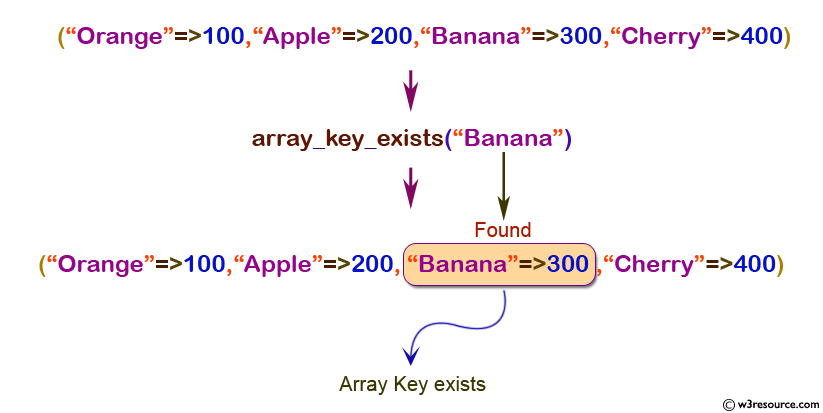php array contains key
array_keys
(PHP 4, PHP 5, PHP 7, PHP 8)
array_keys — Возвращает все или некоторое подмножество ключей массива
Описание
Список параметров
Массив, содержащий возвращаемые ключи.
Если указано, будут возвращены только ключи у которых значения элементов массива совпадают с этим параметром.
Определяет использование строгой проверки на равенство (===) при поиске.
Возвращаемые значения
Примеры
Пример #1 Пример использования array_keys()
Результат выполнения данного примера:
Смотрите также
User Contributed Notes 28 notes
It’s worth noting that if you have keys that are long integer, such as ‘329462291595’, they will be considered as such on a 64bits system, but will be of type string on a 32 bits system.
?>
will return on a 64 bits system:
but on a 32 bits system:
I hope it will save someone the huge headache I had 🙂
Here’s how to get the first key, the last key, the first value or the last value of a (hash) array without explicitly copying nor altering the original array:
Since 5.4 STRICT standards dictate that you cannot wrap array_keys in a function like array_shift that attempts to reference the array.
Invalid:
echo array_shift( array_keys( array(‘a’ => ‘apple’) ) );
But Wait! Since PHP (currently) allows you to break a reference by wrapping a variable in parentheses, you can currently use:
echo array_shift( ( array_keys( array(‘a’ => ‘apple’) ) ) );
However I would expect in time the PHP team will modify the rules of parentheses.
There’s a lot of multidimensional array_keys function out there, but each of them only merges all the keys in one flat array.
Here’s a way to find all the keys from a multidimensional array while keeping the array structure. An optional MAXIMUM DEPTH parameter can be set for testing purpose in case of very large arrays.
NOTE: If the sub element isn’t an array, it will be ignore.
output:
array(
‘Player’ => array(),
‘LevelSimulation’ => array(
‘Level’ => array(
‘City’ => array()
)
),
‘User’ => array()
)
array (size=4)
0 => string ‘e’ (length=1)
1 => int 1
2 => int 2
3 => int 0
—-
expected to see:
dude dude dude
Sorry for my english.
I wrote a function to get keys of arrays recursivelly.
Here’s a function I needed to collapse an array, in my case from a database query. It takes an array that contains key-value pairs and returns an array where they are actually the key and value.
?>
Example usage (pseudo-database code):
= db_query ( ‘SELECT name, value FROM properties’ );
/* This will return an array like so:
/* Now this array looks like:
?>
I found this handy for using with json_encode and am using it for my project http://squidby.com
This function will print all the keys of a multidimensional array in html tables.
It will help to debug when you don?t have control of depths.
An alternative to RQuadling at GMail dot com’s array_remove() function:
The position of an element.
One can apply array_keys twice to get the position of an element from its key. (This is the reverse of the function by cristianDOTzuddas.) E.g., the following may output «yes, we have bananas at position 0».
Hope this helps someone.
# array_keys() also return the key if it’s boolean but the boolean will return as 1 or 0. It will return empty if get NULL value as key. Consider the following array:
Array
(
[ 0 ] => first_index
[ 1 ] => 1
[ 2 ] => 0
[ 3 ] => 4
[ 4 ] => 08
[ 5 ] => 8
[ 6 ] =>
)
This function will extract keys from a multidimensional array
Array
(
[color] => Array
(
[1stcolor] => blue
[2ndcolor] => red
[3rdcolor] => green
)
[size] => Array
(
[0] => small
[1] => medium
[2] => large
)
Array
(
[0] => color
[1] => 1stcolor
[2] => 2ndcolor
[3] => 3rdcolor
[4] => size
[5] => 0
[6] => 1
[7] => 2
)
All the cool notes are gone from the site.
Here’s an example of how to get all the variables passed to your program using the method on this page. This prints them out so you can see what you are doing.
Simple ways to prefixing arrays;
[1] => Array
(
[product_id] => 2
[product_name] => Bar
)
I was looking for a function that deletes either integer keys or string keys (needed for my caching).
As I didn’t find a function I came up with my own solution.
I didn’t find the propiest function to post to so I will post it here, hope you find it useful.
?>
You can of course define constants to have a nicer look, I have chosen these: EXTR_INT = 1; EXTR_STRING = 2
EXTR_INT will return an array where keys are only integer while
EXTR_STRING will return an array where keys are only string
A needed a function to find the keys which contain part of a string, not equalling a string.
PHP: array_key_exists ищет быстрее чем in_array в 500 раз
В 2014 уже писали про обыск массива, но вряд ли кто понял.
C тех пор вышло много версий PHP и не исправили значит обратная связь плохая и об этом мало кто знает. На питоне так же, и в 3* хуже чем в 2.7.
Иногда нужно найти строку в массиве строк — очень частая операция в разных алгоритмах и если массив небольшой и искать немного и не в цикле, то in_array нормально, на общую скорость не влияет, но если big data и искать надо массиве из миллиарда строк и миллиард раз, то это уже критично: лучше час вместо недели.
Простой тест показывает:
in_array ищет за 6-9 сек ideone.com/Yb1mDa 6600ms
а array_key_exists ищет тоже самое, но быстрее в 250(php5.6/py3.*) в 400+ раз (php7.3/py2.7) ideone.com/gwSmFc (цикл увеличен в 100 раз) 12ms (6600/12=550раз +-10% разброс из-за нагрузки и кеша)
Почему же такое происходит? Рассмотрим подробно:
1) Поиск строк на чистом ассемблере/си это сортировка массива строк (быстрая или пузырьковая), затем бинарный поиск.
Число шагов в бинарном поиске log(n) раз и зависит от размера массива, и намного меньше чем простой перебор.
Отсортировать массив строк можно заранее, один раз и закешировать, а потом делать миллиард поисков. Но это не помогает.
По умолчанию сортировка происходит каждый раз снова, хотя писали что улучшили в 7.2 in_array через хеш, но немного.
Размер хеша, алгоритм хеширования зашит в движок пхп и его не поменять, хотя исходники открыты- можно скачать изменить и скомпилировать если сервер свой.
Дальше можно не читать, меняйте in_array на array_combine + array_key_exists и всё.
Число шагов при поиске по хешу зависит от количества коллизий и кол-ва строк с одинаковым хешем. Их нужно перебирать или также сортировать и бинарный поиск.
Для уменьшения коллизий можно выделить больше памяти, если возможно, что сейчас не такая проблема, как 50 лет назад когда 1 кб памяти на магн.катушках стоил как самолет. А именно тогда были придуманы все основные алгоритмы: sort/zip/gif/jpg/итд — им не надо много памяти, но они плохие, сейчас есть намного лучше, но им надо много памяти 1-16 Мб. Да, есть серверы с 256 Мб и на каждого отдельный поток и 16 Мб уже много, но на девайсе среднего юзера 1 Гб как минимум и 16 Мб это капля в море.
Еще больший эффект можно получить если заменить вызов функции array_key_exists на конструкцию isset($mphp array contains key), она не чистит очередь команд и кеш, не использует стек и быстрее где-то на 20%.
Так же можно еще ускорить если создать массив 2х первых букв- 4*16кб и искать сначала по смещению (индекс=код 1го символа + 2го*256) указатель на массив хешей для остальной части строки, затем ищем уже среди маленького массива «хвостов» строк и коллизий на порядок меньше.
Это требует еще больше памяти и алгоритм сложнее, но поиск быстрее в 30+ раз. Но в пхп это не реализовано, можно написать свою библиотеку so/dll и вызывать, или попросить разработчиков добавить в 7.5.
Можно искать через mySQL, но надо группировать запросы и это будет все равно медленней.
How to check if multiple array keys exists
I have a variety of arrays that will either contain
How would I check to see if an array contains both story and message? array_key_exists() only looks for that single key in the array.
Is there a way to do this?
21 Answers 21
Here is a solution that’s scalable, even if you want to check for a large number of keys:
If you only have 2 keys to check (like in the original question), it’s probably easy enough to just call array_key_exists() twice to check if the keys exists.
However this obviously doesn’t scale up well to many keys. In that situation a custom function would help.
Surprisingly array_keys_exist doesn’t exist?! In the interim that leaves some space to figure out a single line expression for this common task. I’m thinking of a shell script or another small program.
Note: each of the following solutions use concise […] array declaration syntax available in php 5.4+
array_diff + array_keys
array_reduce + unset
The construction is easy to modify since the keys we’re interested in fit nicely on the bottom line.
array_filter & in_array
Simpler to write than the array_reduce solution but slightly tricker to edit. array_filter is also an iterative callback that allows you to create a filtered array by returning true (copy item to new array) or false (don’t copy) in the callback. The gotchya is that you must change 2 to the number of items you expect.
This can be made more durable but verge’s on preposterous readability:
array_key_exists in php with NULL Values giving no output
I have the following query:
If density is not present the value will be «NULL».
gives following output:
I need to check whether the array is having values or not and to provide select options, if array not empty.
3 Answers 3
Try something like this
I think you are trying to check for null values in an array try
Function will give you all empty or NULL keys as an array
Depending on whether you expect to get back multiple results from your query could change the answer, especially if you get back say 1 result with a NULL and one without. But you could do.
The function will return false if any result has null, regardless of how many are not null
Not the answer you’re looking for? Browse other questions tagged php arrays or ask your own question.
Related
Hot Network Questions
Subscribe to RSS
To subscribe to this RSS feed, copy and paste this URL into your RSS reader.
site design / logo © 2021 Stack Exchange Inc; user contributions licensed under cc by-sa. rev 2021.9.17.40238
By clicking “Accept all cookies”, you agree Stack Exchange can store cookies on your device and disclose information in accordance with our Cookie Policy.
PHP: array_key_exists() function
PHP: Checks if the given key or index exists in an array
The array_key_exists() function is used to check whether a specified key is present in an array or not.
The function returns TRUE if the given key is set in the array. The key can be any value possible for an array index.
Version:
Syntax:
Parameters:
| Name | Description | Required / Optional | Type |
|---|---|---|---|
| array_key | Value to check. | Required | Mixed* |
| array_name | The specified array whose keys will be checked. | Required | Array |
*Mixed: Mixed indicates that a parameter may accept multiple (but not necessarily all) types.
Return value
TRUE on success or FALSE on failure.
Value Type: Boolean
Example:
Pictorial Presentation:
Practice here online :
See also
Previous:array_intersect
Next: array_keys
PHP: Tips of the Day
PHP: Showing all errors and warnings
Display errors could be turned off in the php.ini or your Apache configuration file.
You can turn it on in the script:
You should see the same messages in the PHP error log.



